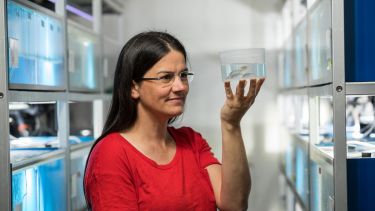The format is to invite inspirational female academics representing an early and a later career stage. This year we have two fantastic speakers: Dr Felicity Jones from the Max Planck Institute Tübingen and Professor Jane Hill from the University of York.
Margaret Savigear received her BSc from what was then the Department of Zoology in 1939, and was awarded an MSc in 1949. Her pursuit of a postgraduate degree was unusual at the time and supported by the then Head of Department, Leonard ES Eastham.
In recognition of Professor Eastham's inspiration and mentoring, Mrs Savigear donated to the department to establish the Leonard Eastham prize for final year undergraduates to undertake a Zoology research project.
The lectures will be followed by a frank and illuminating Q&A session. This is a fantastic opportunity to ask the speakers about their research, career and get advice. Our aim with this event is to offer inspiring role models for our researchers, especially those early in their careers.
Monday 9th March 2020, 1pm-4.30pm
Alfred Denny Building, Lecture Theatre 2 and Conference Room
Programme:
| 1.00-1.10pm | Introduction by Rob Freckleton, ADLT2 (Head of Animal and Plant Sciences, University of Sheffield) |
| 1.10-2.00pm | Dr Felicity Jones (Max Planck Institute Tübingen), ADLT2 |
| 2.10-3.00pm | Professor Jane Hill (University of York), ADLT2 |
| 3.00-3.30pm | Refreshments and informal discussions, Alfred Denny Conference Room |
| 3.30-4.30pm | Q&A with early career researchers, Alfred Denny Conference Room |
About the speakers
Dr Felicity Jones - Max Planck Institute Tübingen
Bio: Felicity Jones is a Research Group Leader at the Friedrich Miescher Laboratory of the Max Planck Society, Tübingen, Germany. Her group studies adaptive genome function in natural populations using the threespine stickleback fish. They are using chromatin profiling, comparative epigenomics, transcriptomics and transgenic approaches to study how the regulatory genome contributes to rapid adaptation. Supported the German and European Research Councils they also study features of meiotic recombination and standing genetic variation that facilitate and constrain rapid adaptation to new environments.
Visit Dr Felicity Jones' website
Title: Regulatory genomics of adaptation in sticklebacks
Abstract: The genome contains an organism's complete set of instructions for development, survival and reproduction. “Decoding” these instructions, particularly the functional effects of naturally occurring genomic variation under a range of environmental conditions, remains one of the biggest challenges in biology with enormous implications for medicine, agriculture, and conservation. The adaptation of natural populations to changing environments is often driven by numerous genetic loci predominantly found in non-coding regions with likely gene regulatory roles. Using adaptively diverging marine and freshwater stickleback fish ecotypes as a model, we have previously identified more than 81 predominantly intergenic loci across the genome that have alleles consistently divergent between marine and freshwater ecotypes. In my talk I am going to discuss two linked aspects of this research programme: defining the components of chromatin and transcription regulation underlying adaptive divergence using functional genomics approaches like allele-specific RNAseq, ChIPseq, ATACseq, and transgenic assays, and investigations into how meiotic recombination and standing genetic variation facilitate and constrain the shuffling and reassembly of adaptive variation. These approaches highlight how cis-acting changes are particularly important for divergent adaptation with on-going gene flow because they are closely linked to the genomic elements they regulate. Together these approaches provide insight into how natural selection shapes genome function, and how molecular mechanisms can facilitate rapid adaptation in the wild.
Professor Jane Hill - University of York
Bio: Prof Jane Hill is a professor of ecology in the Department of Biology at the University of York. She is a research theme leader for ‘Resilient Ecosystems’ in the York Environmental Sustainability Institute (YESI) and a member of York’s Leverhulme Centre for Anthropocene Biodiversity. Jane is a trustee of the SE Asia Rainforest Research Partnership, and a trustee of the British Ecological Society, where she chairs the BES Publications Committee. She received a Marsh/ZSL Award for Conservation Biology in 2011, and is an Honorary Fellow of the Royal Entomological Society. Jane is also involved in promoting women in science; leading the York Biology Department to an Athena SWAN Gold Award.
Visit Professor Jane Hill's website
Title: Biodiversity winners and losers from climate warming
Abstract: The climate is changing and there are several ways in which species can respond to these changes: e.g. by shifting their ranges, local adaptation, and/or altering their phenology. Britain has a wealth of information about changes in biodiversity over many decades of anthropogenic warming because of the general public’s fascination for recording animals and plants – and butterflies are a particular favourite. This citizen science information helps us examine species’ responses, and the factors responsible for variation among species. My talk will consider the different responses of species, and how this knowledge is being used to inform conservation management, such as improving habitat connectivity for range expansion. Recent media reports about ‘insectageddon’ together with the IPBES estimate that 1 million species are threatened with extinction, makes it imperative to understand which species are winners and losers in the Anthropocene.



